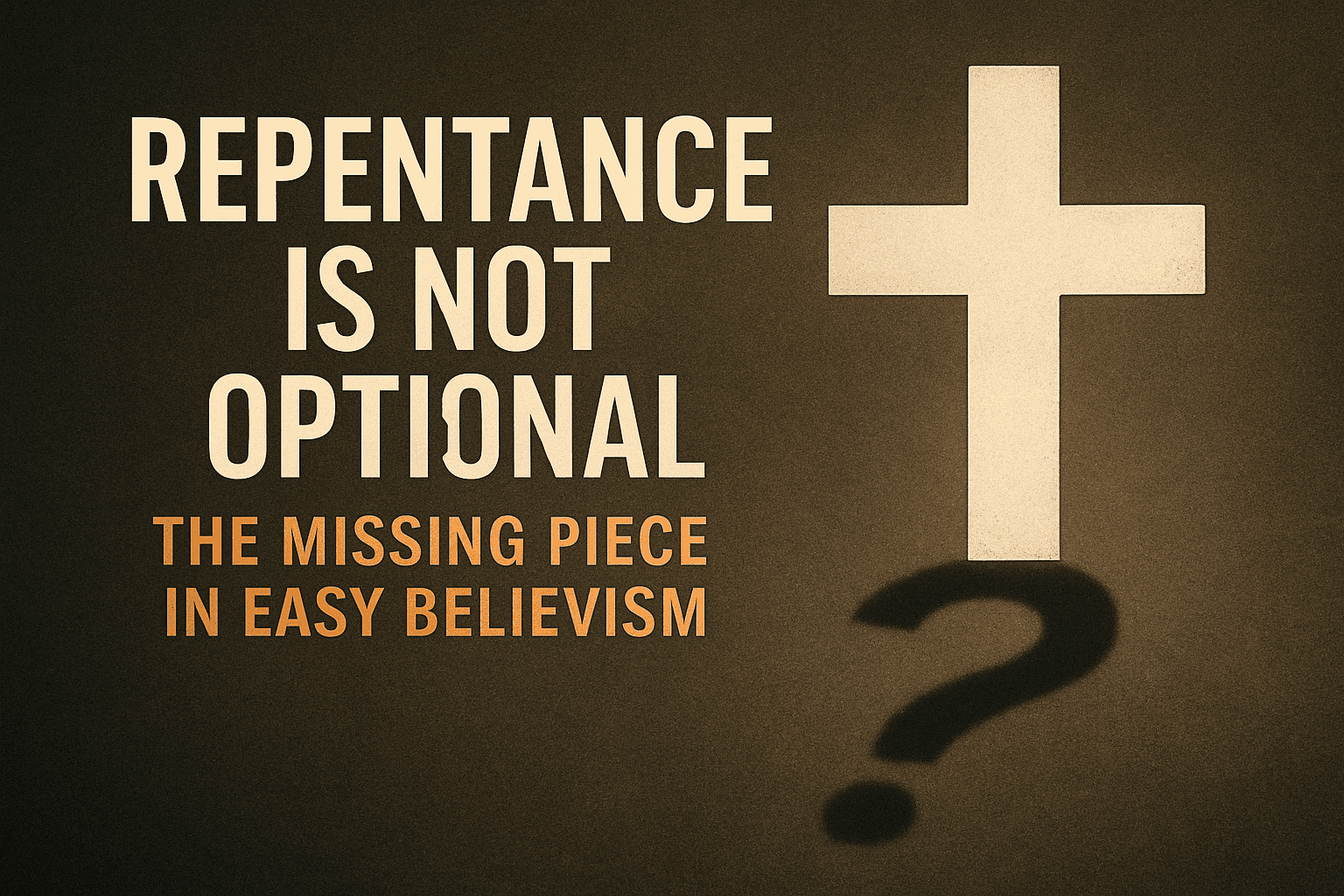Repentance Is Not Optional: The Missing Piece in Easy Believism
You can’t remove repentance from the gospel and still call it the gospel.
But that’s exactly what easy believism has done.

In its rush to make salvation simple and palatable, easy believism has taken the sharp edges off God’s Word. It promises heaven without holiness, forgiveness without forsaking sin, and faith without following Christ. All you have to do is “believe.” No need to repent. No need to turn. Just agree with the facts and say the prayer.
But that’s not how Jesus preached. It’s not how the apostles preached. And it’s not the gospel that saves.
Because repentance is not optional.
The Core Problem with Easy Believism
At the heart of this shallow gospel is a dangerous reduction of truth. It treats salvation as a one-time transaction, detached from any real heart change. As long as you’ve prayed the sinner’s prayer or raised your hand at an altar call, you’re in. No fruit required. No transformation expected. Just “believe,” and you’re covered.
But Scripture tells a different story.
“Unless you repent,” Jesus said, “you will all likewise perish” (Luke 13:3). That’s not a footnote. It’s a foundational truth.
This modern distortion ignores it. It preaches a gospel of cheap grace—grace that requires nothing, produces nothing, and transforms nothing. It leaves sinners unconvicted and converts unchanged.
But repentance is not some theological upgrade you add later. It is the missing piece in easy believism precisely because it is essential to saving faith.
What Scripture Says About Repentance
Jesus didn’t begin His ministry with “God loves you and has a wonderful plan for your life.” He began with this: “Repent, for the kingdom of heaven is at hand” (Matt. 4:17). Repentance wasn’t an add-on—it was the entry point.
When Peter stood at Pentecost, filled with the Holy Spirit, he didn’t say, “Accept Jesus into your heart.” He said, “Repent and be baptized… for the forgiveness of your sins” (Acts 2:38).
Paul summed up his entire ministry with these words: “I did not shrink from declaring… repentance toward God and faith in our Lord Jesus Christ” (Acts 20:21).
Repentance and faith are not enemies. They are two sides of the same coin. Faith believes. Repentance turns. Together, they describe the full response of the heart to the gospel of grace.
What Repentance Actually Is
Repentance is not just feeling bad about your sin. It is not an emotional outburst or a temporary regret. The biblical word—metanoia—means a change of mind that leads to a change of life.
It is a Spirit-wrought turning. Away from sin. Toward God. It’s a reorientation of the entire heart. A death to self and a submission to Christ.
Repentance is not a work that earns salvation. It is the fruit of conviction. It’s what happens when the Holy Spirit opens blind eyes and awakens a dead heart. It’s not optional because it’s not negotiable. You cannot receive Christ as Savior while clinging to the very sin He came to free you from.
And yet this diluted gospel teaches you can.
Why Repentance Is Rejected
Many who promote a no-cost version of Christianity say they’re just protecting grace. They worry that if repentance is required, salvation becomes “works-based.” But they’ve misunderstood both grace and repentance.
Grace is not the absence of obedience—it’s the power for it. “The grace of God has appeared… training us to renounce ungodliness” (Titus 2:11–12). True grace doesn’t excuse sin. It teaches you to leave it.
And repentance isn’t a work you perform. It’s a miracle God grants. That’s why Acts 11:18 says, “God has granted repentance that leads to life.” If God grants it, it isn’t earned. But it is essential.
A gospel that omits repentance in the name of grace ends up removing grace altogether. Because the grace of God does not leave people where it found them.
A Long Line of Witnesses
The idea that repentance is essential is not a modern invention. It has stood at the center of faithful preaching for centuries.
John the Baptist prepared the way with the cry, “Repent, for the kingdom of heaven is at hand” (Matt. 3:2). Jesus preached the same message. So did the apostles. So did the early church fathers, the Reformers, and the Puritans.
H.A. Ironside once warned, “The doctrine of repentance is the missing note in many otherwise orthodox circles today.” That was in the early 20th century. The same note is still missing. And the music of modern gospel preaching sounds disturbingly off-key.
Because where repentance is missing, Christ is misrepresented.
What Happens When Repentance Is Preached
When repentance is restored to the gospel, the gospel regains its power. It convicts, not just comforts. It exposes, not just embraces. It calls people to die to themselves, not just improve their lives.
True repentance leads to a new way of living. “If anyone is in Christ, he is a new creation. The old has passed away” (2 Cor. 5:17). That doesn’t mean perfection. It means direction. The believer walks differently because he has been made new.
Faith that doesn’t change your life didn’t save your soul. That’s why James said, “Faith without works is dead” (James 2:17). Not because we are saved by works—but because saving faith always works.
Counterfeit gospels can’t produce that kind of faith. Because they have no place for repentance.
Why This Matters Right Now
We are watching an entire generation grow up in churches where the gospel has been diluted. They’ve heard that Jesus loves them. They’ve been told to accept Him. But they’ve never been told to repent. They were never warned of hell. Never told about the cost of discipleship. Never confronted with the holiness of God.
They think they’re saved because someone once told them they were. But they’ve never turned from their sin. Never bowed the knee. Never surrendered the throne of their heart to Christ.
This is what easy believism produces: decisions without discipleship, professions without possession, churches full of people who think they’re safe—when they’re still lost.
And the fault lies with us if we do not preach repentance.
Who’s Preaching a Gospel Without Repentance?

You don’t have to look far to see how widespread this diluted message “easy believism” has become. Entire platforms are built around belief without repentance—messages that comfort the sinner without confronting the sin. Here are a few of the most influential voices where that pattern shows up:
- Joel Osteen – Lakewood Church (Houston, TX)
Osteen leads the largest church in America and is known for his emphasis on positivity and personal success. But his sermons rarely, if ever, address sin, judgment, or repentance—opting instead for therapeutic encouragement and general affirmations of God’s love. - Andy Stanley – North Point Community Church (Alpharetta, GA)
Stanley’s seeker-sensitive preaching often avoids the sharper edges of Scripture, including repentance and holiness. He has been publicly critiqued for distancing the church from biblical authority and reframing faith in terms that are more palatable than convicting. - Steven Furtick – Elevation Church (Charlotte, NC)
Furtick’s messages are high-energy and emotionally charged but frequently light on biblical substance. The cross, sin, and repentance are often replaced with slogans and self-help language that leave hearers inspired but not transformed. - T.D. Jakes – The Potter’s House (Dallas, TX)
While influential and widely followed, Jakes’s teaching often blends emotional uplift with prosperity themes, minimizing the core gospel call to turn from sin. Critics have noted a consistent lack of clarity on repentance and Christ’s lordship in his messages.
These aren’t small errors. When repentance is missing, so is the gospel. And when the gospel is compromised, souls are left deceived.
The Call Remains
Jesus hasn’t changed His message.
He still says, “Repent and believe the gospel” (Mark 1:15). That’s the whole message. Not just believe. Not just agree. Repent—and believe.
You cannot meet the risen Lord and remain the same.
You cannot be filled with the Spirit and continue to live like the world.
You cannot carry the name of Christ and cling to the idols of your old life.
If repentance is missing, Christ is missing. And if Christ is missing, the gospel you believed was not the gospel that saves.
Count the Cost—and Proclaim the Whole Gospel
We need to stop softening the gospel to make it more appealing. It is not our job to make it palatable. It is our job to proclaim it. And the gospel of Jesus Christ is a gospel that calls men and women to repent.
Yes, salvation is by grace alone. Yes, faith is the instrument by which we are saved. But that faith must be the kind that turns. The kind that surrenders. The kind that leaves sin behind—not perfectly, but honestly.
Anything less is not Christianity. It is easy believism.
And easy believism saves no one.
Want to see what real repentance looks like in the life of a believer?
Check out this companion article: What Does Genuine Repentance Look Like?
Walt Roderick is a Christian writer who cares more about biblical clarity than online applause. He writes to strengthen believers and confront spiritual drift.






